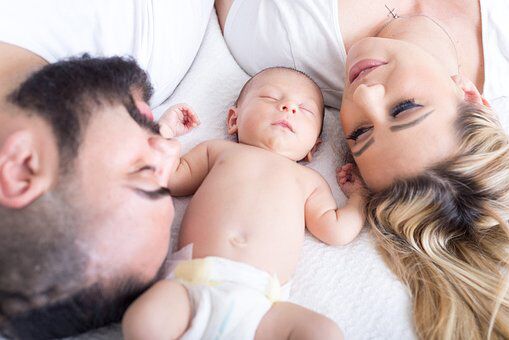Building a Long-Term Relationship of Trust and Health Between Parents and Children
The return of a mother and her newborn from the maternity ward marks the beginning of a deeply emotional and delicate period. During the first one to two months, the mother and baby begin to bond, gradually synchronising the infant’s needs with the mother’s rhythms and abilities. This phase, often more challenging with first-time parents, may involve significant stress—especially if the mother is recovering slowly or the baby experiences intense colic. These early difficulties are entirely normal and can be greatly eased with the support of family members, nurses, and paediatricians.
Supporting the Mother – A Key to Healthy Attachment
The mother should be the central focus during this transition. Emotional support, encouragement, and validation play a vital role in building her confidence and sense of competence in motherhood. Strengthening this maternal self-assurance is essential for forming a secure mother-infant bond—one of the most important foundations for lifelong mental health and emotional stability. It also positively influences the duration and success of breastfeeding, which is often discontinued prematurely due to maternal anxiety and insecurity.
Creating a Safe, Calm Environment at Home
After returning home, it is important to establish a peaceful routine that includes feeding, sleeping, hygiene, and communication. Frequent or early visits from extended family and friends—however well-intentioned—can become overwhelming. Visitors who are sick, even with a mild cold or digestive symptoms, should be discouraged from visiting. Be especially cautious with preschool-aged children who may unknowingly carry and transmit bacteria or viruses, even if they appear healthy.
To prevent infection, all adults should thoroughly wash their hands before holding or touching the newborn. If older children in the household attend school or daycare, it may be advisable to temporarily minimise close contact to reduce the risk of illness being passed to the newborn.
Going Outside: What to Avoid
There are no specific restrictions for going outdoors with your newborn as long as the weather is appropriate. Avoid outings in extreme cold, heat, or high winds. Steer clear of crowded indoor spaces with closed air circulation systems—such as shopping malls—as these environments can harbour airborne pathogens that pose risks to newborns and infants with developing immune systems.
Nutrition and Breastfeeding – Myths and Best Practices
Breastfeeding mothers do not need to restrict their diets unnecessarily. There is no evidence that consuming fresh fruits or vegetables causes infant colic. Instead, mothers should focus on natural, minimally processed foods. Avoid industrially processed or fast foods, and choose organic produce whenever possible. Harmful substances from food can concentrate in breast milk at levels 20–30 times higher than in the mother’s bloodstream.
It is recommended that breastfeeding mothers take daily supplements that include multivitamins, minerals, and omega-3 fatty acids. In cases of infant colic, dietary changes such as eliminating dairy or specific food groups should not be made without first consulting a paediatrician or nurse. Making uninformed dietary restrictions can lead to nutritional deficiencies in the mother and does not necessarily benefit the baby.
Frequently Asked Questions
1. When is it safe to take a newborn outside?
As long as the weather is not extreme, you can take your newborn outside. Avoid crowded indoor places and exposure to wind, heat, or cold.
2. How can we support maternal mental health after birth?
Offer emotional support and reduce external pressures. Confidence in early motherhood helps create a strong bond and reduces stress-related breastfeeding issues.
3. Should visitors be allowed during the first weeks?
Limit visitors, especially those who are sick or recently exposed to illness. Protect your baby’s immune system by ensuring good hygiene and avoiding crowded environments.
4. Do breastfeeding mothers need to follow a restricted diet?
No. Healthy, unprocessed foods are recommended. Don’t eliminate food groups without medical advice, even in cases of suspected colic.
5. When should parents seek help?
At any sign of emotional distress, feeding problems, or questions about infant care, consult a pediatrician or trusted nurse.
Consult When in Doubt
Proper maternal nutrition, emotional support, and a calm environment all contribute to a healthy postpartum adjustment period. Whenever concerns arise—whether physical or emotional—don’t hesitate to seek guidance from a trusted nurse, paediatrician, or family health expert. Together, we can support a stable and nurturing environment for both mother and child.
Use tools like the LittleDot app to track feeding, symptoms, and milestones, and to consult pediatricians or nutritionists directly via chat or video. A well-informed parent is a confident and empowered caregiver.
Reference:
- UNICEF. (2019). Nutrition, for every child: UNICEF nutrition strategy 2020–2030. https://www.unicef.org/media/91711/file/UNICEF-Nutrition-Strategy-2020-2030.pdf
- World Health Organization. (2022). Postnatal care of the mother and newborn: WHO recommendations. https://www.who.int/publications/i/item/9789240066552
- Britton, J. R., Britton, H. L., & Gronwaldt, V. (2006). Breastfeeding, sensitivity, and attachment. Pediatrics, 118(5), e1436–e1443. https://doi.org/10.1542/peds.2005-2706
- Tharner, A., et al. (2012). Breastfeeding and its relation to maternal sensitivity and infant attachment. Journal of Developmental & Behavioral Pediatrics, 33(5), 396–404. https://doi.org/10.1097/DBP.0b013e318257fac3
